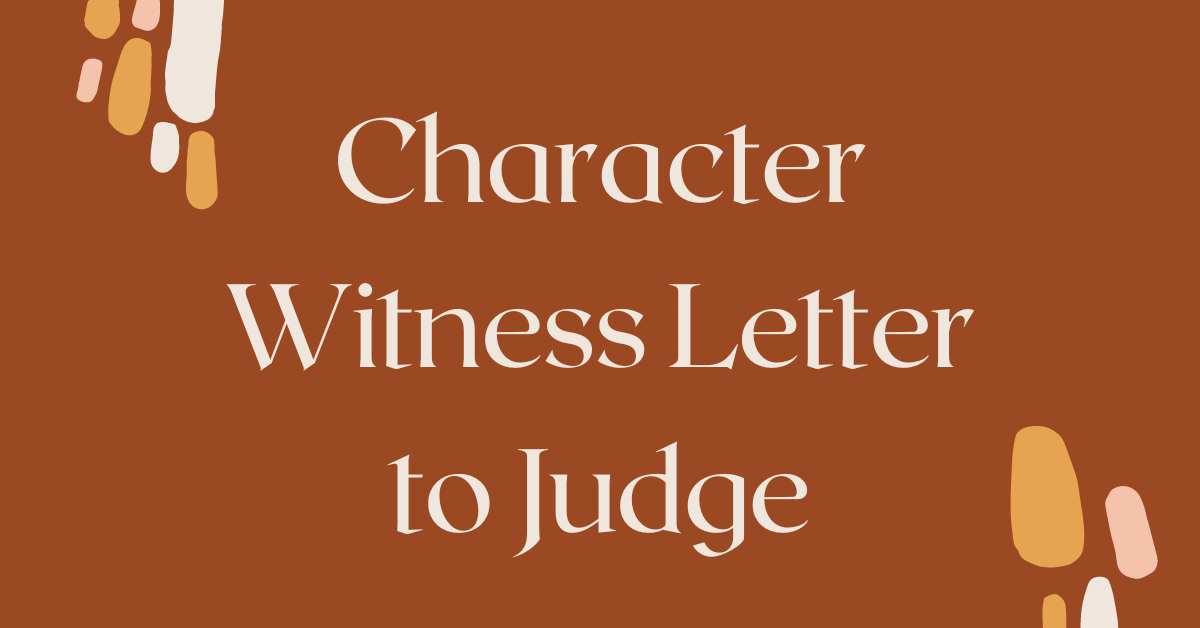A “Character Witness Letter to Judge” is a written statement provided by someone who knows the defendant personally and can attest to their character and reputation. Its purpose is to provide the judge with additional information about the defendant’s character, behavior, and integrity, which may influence the sentencing or outcome of a legal proceeding.
In this article, we will provide you with templates, examples, and samples of Character Witness Letters to Judge. These resources are designed to assist individuals in writing effective letters that accurately portray the defendant’s character and help support their case in court. Whether you’re writing a letter for a friend, family member, or colleague, our sample letters will guide you in crafting a compelling and persuasive testimony.
By offering practical examples and templates, we aim to make the process of writing a Character Witness Letter to Judge easier and more accessible for our readers. Our goal is to help you effectively communicate your thoughts and experiences with the defendant in a way that positively impacts the judge’s perception and decision-making process.

Sample of a Character Witness Letter to Judge
[Your Name]
[Your Address]
[City, State, Zip Code]
[Date]
The Honorable [Judge’s Name]
[Court Name]
[Court Address]
[City, State, Zip Code]
Dear Judge [Judge’s Last Name],
I am writing to you as a character witness on behalf of [Defendant’s Name]. I have known [Defendant’s Name] for [duration of time], and I am familiar with their character and conduct in both personal and professional settings. I am confident that my testimony will provide valuable insight into [Defendant’s Name]’s character and integrity.
Throughout my interactions with [Defendant’s Name], I have consistently observed them to be a person of high moral character, integrity, and honesty. They have always conducted themselves with dignity, respect, and compassion towards others. In my opinion, [Defendant’s Name] is a person of upstanding character who has made positive contributions to their community.
I believe that [Defendant’s Name] is deserving of leniency and a fair consideration from the court. I have witnessed firsthand their commitment to personal growth, rehabilitation, and making amends for any past mistakes. I am confident that they are genuinely remorseful for their actions and are dedicated to making positive changes in their life.
In conclusion, I respectfully request that you consider my testimony as you weigh the factors in [Defendant’s Name]’s case. I am hopeful that my insights into [Defendant’s Name]’s character will assist you in making an informed decision that is fair and just. Thank you for your attention to this matter.
Sincerely,
[Your Name]
How to write a Character Witness Letter to Judge

Understanding the Purpose
Before delving into the specifics of writing a Character Witness Letter to a Judge, it’s essential to grasp its purpose. This type of letter serves as a testimonial on behalf of an individual facing a legal proceeding, providing insights into their character, integrity, and reputation. The primary goal is to influence the judge’s perception of the defendant and potentially impact the sentencing or outcome of the case.
Identifying Key Components
To write an effective Character Witness Letter, it’s crucial to identify and understand its key components. These include introducing yourself as the witness, providing details of your relationship with the defendant, offering specific examples or anecdotes that illustrate their character, expressing your opinion on their integrity and moral character, and concluding with a respectful request for leniency or fair consideration from the judge.
Crafting a Compelling Narrative
When crafting your Character Witness Letter, aim to create a compelling narrative that vividly portrays the defendant’s character and personal qualities. Use descriptive language and specific examples to illustrate their positive traits, such as honesty, kindness, integrity, and reliability. Avoid vague or general statements and focus on concrete instances or experiences that highlight the defendant’s character strengths and virtues.
Maintaining Professionalism and Respect
While it’s essential to advocate for the defendant in your letter, it’s equally important to maintain professionalism and respect throughout. Address the judge with proper courtesy and respect, adhere to formal letter-writing conventions, and avoid using overly emotional or biased language. Present your testimony in a clear, concise, and objective manner, focusing on facts and observations rather than personal opinions or conjecture.
Seeking Feedback and Review
Before finalizing your Character Witness Letter, consider seeking feedback and review from trusted individuals, such as legal professionals, friends, or family members. They can provide valuable insights, offer suggestions for improvement, and ensure that your letter effectively conveys the intended message. Be open to constructive criticism and willing to make revisions as needed to enhance the clarity and impact of your testimony.
Submitting the Letter
Once your Character Witness Letter is polished and refined, it’s time to submit it to the court. Follow any specific guidelines or instructions provided by the court regarding the submission of character witness letters. Ensure that your letter is formatted correctly, properly addressed to the judge, and submitted within the specified deadline. Consider sending the letter via certified mail or delivering it in person to ensure its timely receipt and inclusion in the court records.
Reflecting on the Impact
After submitting your Character Witness Letter, take a moment to reflect on the potential impact of your testimony. While you may not have direct control over the outcome of the case, know that your letter has contributed to the defendant’s legal defense and provided valuable insights to the judge. Regardless of the outcome, you can take pride in knowing that you have advocated for justice and fairness in the legal system.
FAQs about a Character Witness Letter to Judge
Navigating the process of writing a Character Witness Letter to a Judge can raise several questions. Below are the five most frequently asked questions on this topic, along with their answers.
1. What is a Character Witness Letter to a Judge, and why is it important?
A Character Witness Letter to a Judge is a written statement provided by someone who knows the defendant personally, offering insights into their character and reputation. It’s important because it provides the judge with additional information that may influence the sentencing or outcome of a legal proceeding.
2. Who can write a Character Witness Letter to a Judge?
Anyone who knows the defendant personally and can provide valuable insights into their character, integrity, and reputation can write a Character Witness Letter to a Judge. This may include friends, family members, colleagues, mentors, or community members.
3. What should be included in a Character Witness Letter to a Judge?
In a Character Witness Letter to a Judge, it’s important to introduce yourself, explain your relationship with the defendant, and provide specific examples or anecdotes that illustrate their character and integrity, express your opinion on their character, and respectfully request fair consideration from the judge.
4. How should I address the judge in a Character Witness Letter?
When addressing the judge in a Character Witness Letter, it’s important to use proper titles and forms of address, such as “Your Honor” or “The Honorable [Judge’s Last Name].” This demonstrates respect and professionalism in your communication.
5. What tone should I use in a Character Witness Letter to a Judge?
In a Character Witness Letter to a Judge, it’s important to maintain a respectful and professional tone throughout. Avoid using overly emotional or biased language, and focus on presenting factual information and observations that support your testimony.
RELATED:
Letter of Recommendation to a Judge
